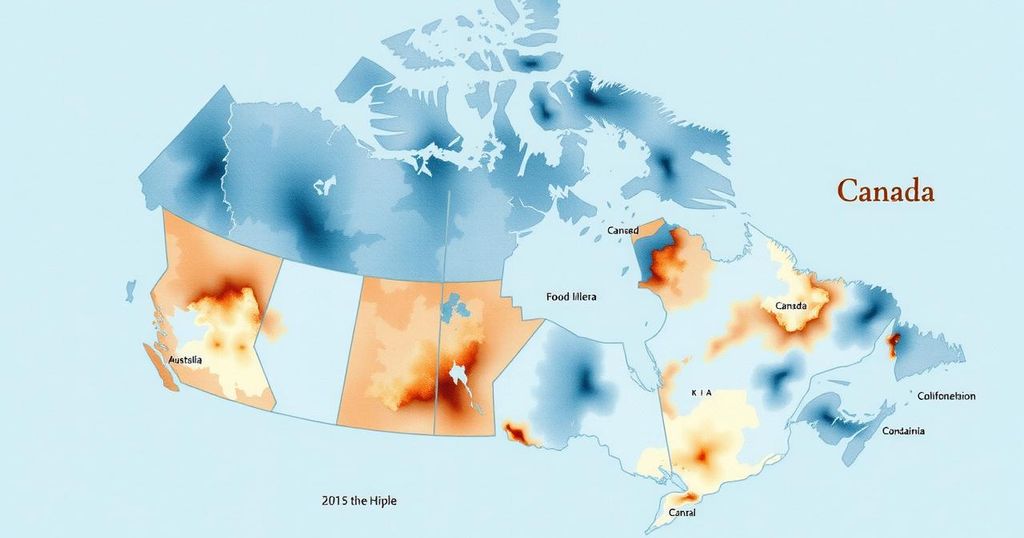The Impact of Donald Trump’s Influence on Australian and Canadian Elections

In the forthcoming elections in Canada and Australia, conservative parties initially favored to win are now trailing in the polls. The decline in support for the Conservatives, attributed to the influence of Donald Trump’s policies, reflects shifting voter sentiments. Analysts suggest that anti-Trump feelings significantly affect electoral outcomes, revealing a desire for leadership prioritizing national interests over U.S. alignment.
In the upcoming weeks, elections in Canada and Australia will witness voters heading to the polls. Initially, conservative parties in both nations were expected to emerge victorious; however, recent polling indicates a significant decline in their standings. Currently, Canada’s Conservative Party, led by Pierre Poilievre, and Australia’s Liberal Party, under Peter Dutton, are trailing behind their center-left counterparts.
Ben Wellings, a senior lecturer in politics at Monash University, noted the parallel nature of these elections, observing that both conservative leaders are experiencing a drop in support. He attributes this decline to the adverse effects of Donald Trump’s influence on right-wing candidates globally. Trump was seen as a catalyst for a wave of right-wing politics, but the anticipated benefits have not materialized in these elections.
The decline is evident in the polling data across both countries. In Australia, while the Coalition began to show improvement in popularity last year, there was a drastic fall in support starting February, coinciding with Trump’s inauguration and his trade policies. In Canada, the Conservatives, expected to win against the unpopular Liberal party, saw a sharp decline from a 20-point lead to trailing by six points following Trudeau’s defiance against Trump’s policies.
This change in dynamics has reinvigorated support for the incumbent Liberal government, led now by Prime Minister Mark Carney, who continued Trudeau’s assertive stance against Trump. Clayton Chin, a Canadian-Australian associate professor, emphasized that questioning national sovereignty altered the electoral discourse significantly, making it difficult for Poilievre to adjust his strategy swiftly enough.
Dutton’s remarks referring to Trump as a “big thinker” and his subsequent political maneuvers have been scrutinized, especially after senator Jacinta Price’s controversial quotes and actions that echoed Trump’s ideology. Dr. Chin highlighted the internal party divisions and notable figures sympathetic to Trump, making it evident that the influence of Trump is still palpable.
Antony Green, the ABC’s chief election analyst, pointed out the similarities in the impact Trump has had on both the Canadian and Australian election landscapes, while also cautioning against overstating this connection. He remarked that while populist policies gained traction, there has been a noticeable retreat from such stances as the campaigns progressed.
Recent polls reveal that anti-Trump sentiment is significantly affecting Australian voters. Data from the Resolve Monitor indicated that a substantial percentage of undecided voters expressed decreased support for Dutton due to Trump’s policies. Additionally, a Lowy Institute survey revealed that nearly two-thirds of Australians harbor minimal trust in the United States for responsible governance.
Public sentiment during this election cycle reflects a strong desire for leadership that prioritizes national interests over aligning with the U.S., as voiced by several Australians concerned about their government’s relationship with Trump. Dr. Chin asserted that the feelings of betrayal stem from long-standing affiliations with the U.S. and the current political climate.
While elections often yield unpredictable outcomes, the Canadian Conservative Party is already facing scrutiny over its performance following a significant lead. Kory Teneycke, a Conservative strategist, criticized the campaign as a colossal failure in effectively managing public opinion. The societal impact of Trump on the political landscape in both nations is acknowledged as historically unparalleled, leading to unexpected electoral shifts as evidenced by the current polling.
In conclusion, the upcoming elections in Canada and Australia have been notably influenced by the political climate shaped by Donald Trump. The decline in support for conservative parties in both regions illustrates the complexities of aligning with Trump’s ideology amid rising anti-Trump sentiments among voters. As the elections approach, the impact of these dynamics will likely determine the political direction of both countries for the near future.
Original Source: www.abc.net.au






